105 articoli nella categoria news
Julian Del Vecchio 16/07/2024 0
La release Urbino ha raggiunto il termine di supporto
Siamo dispiaciuti di annunciarvi che la relase Urbino (32/64 bit) ha raggiunto il suo termine di supporto, tuttavia gli utilizzatori di questo sistema operativo riceveranno ancora gli aggiornamenti di sicurezza fino al 31 dicembre 2024.
Continueremo ad apportare migliorie, seppur lievi, e rilasceremo pacchetti software aggiornati ma con minore intensità, per concentrare i nostri sforzi sulle nuove release.
I mirror della release Urbino saranno disattivati e rimossi a Marzo 2025, per fare spazio a quelli di altre versioni.
I nostri utenti possono creare un backup dei loro dati e scegliere di installare una delle nostre ultime versioni: 11.x, 10 Plus o la rolling Cagliari.
We are sad to announce that the Urbino release (32/64 bit) has reached its end of support, however users of this operating system will still receive security updates until December 31, 2024.
We will continue to make improvements, albeit small, and will release updated software packages but with less intensity, to focus our efforts on new releases.
The Urbino release mirrors will be deactivated and removed in March 2025, to make room for mirrors of other releases.
Our users can create a backup of their data and choose to install one of our latest versions: 11.x, 10 Plus or the rolling Cagliari.
Julian Del Vecchio 11/07/2024 0
Infomaniak sponsorizza attivamente il progetto Ufficio Zero Linux OS
Siamo lieti di annunciarvi la sottoscrizione di una sponsorizzazione annuale tra INFOMANIAK e SIITE SRLS, l'azienda che mantiene e gestisce attivamente lo sviluppo del progetto Ufficio Zero Linux OS.
Infomaniak ha fornito una vps cloud con 4 cpu - 12gb ram - 250gb di spazio gestibile, per un mirror aggiuntivo che stiamo configurando e che sarà aggiunto presto alla lista dei mirror fruibili dalle varie release attive.
Ringraziamo lo sponsor Infomaniak per aver creduto nel nostro progetto e di seguito vi rimandiamo ad un video che vi farà scoprire per quale motivo crediamo che Infomaniak sia lo sponsor giusto.
We are pleased to announce the signing of an annual sponsorship between INFOMANIAK and SIITE SRLS, the company that actively maintains and manages the development of the Ufficio Zero Linux OS project.
Infomaniak has provided a cloud vps with 4 cpu - 12gb ram - 250gb of manageable space, for an additional mirror that we are configuring and that will soon be added to the list of mirrors available from the various active releases.
We thank the sponsor Infomaniak for believing in our project and below we refer you to a video that will make you discover why we believe that Infomaniak is the right sponsor.
Julian Del Vecchio 08/07/2024 0
Desktop Telematico di A.d.E. è disponibile sulle release 10Plus ed 11
Da oggi è possibile utilizzare Desktop Teleatico sulle release 10Plus ed 11 mediante questa breve guida:
- avviate il postinstall e rigenerate la cache dei pacchetti
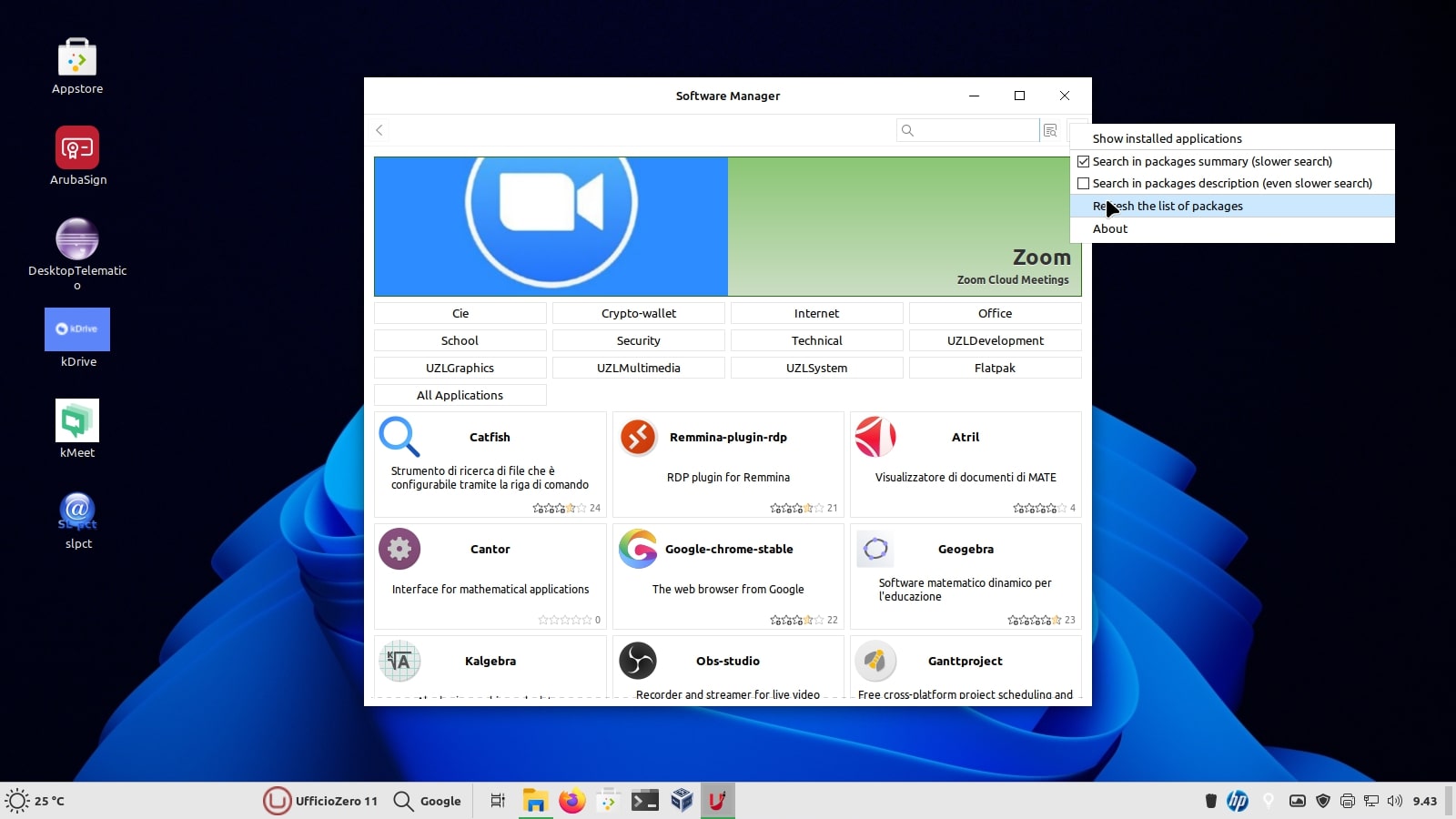
- nella casella "cerca" digitate desktoptelematico
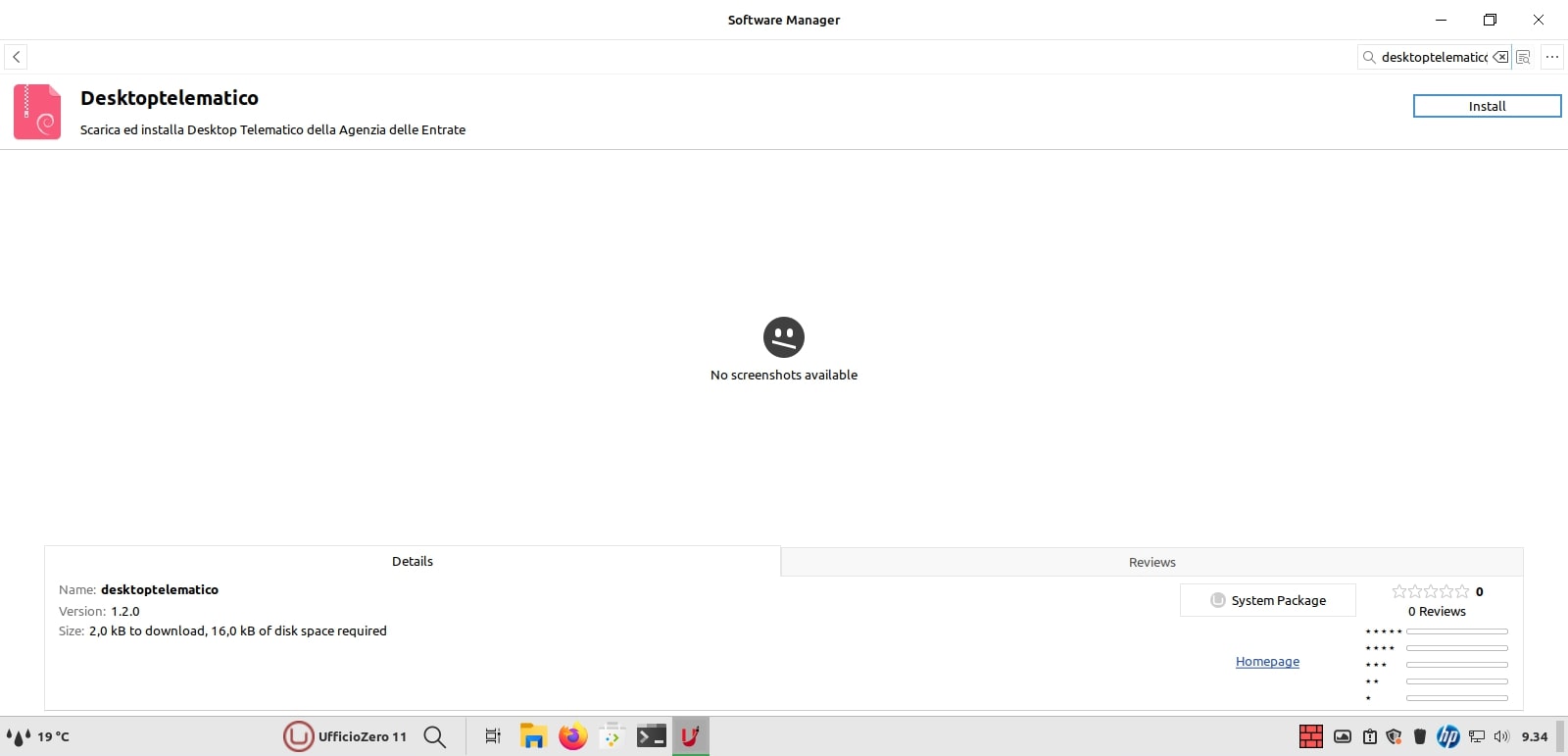
- scegliete di installare l'applicazione

- digitate la password di amministrazione per autenticare l'installazione ed una volta terminata l'installazione chiudete il Postinstall, avviate il menu start (sul pannello la U in cerchio rossa) e digitate desktoptelematico
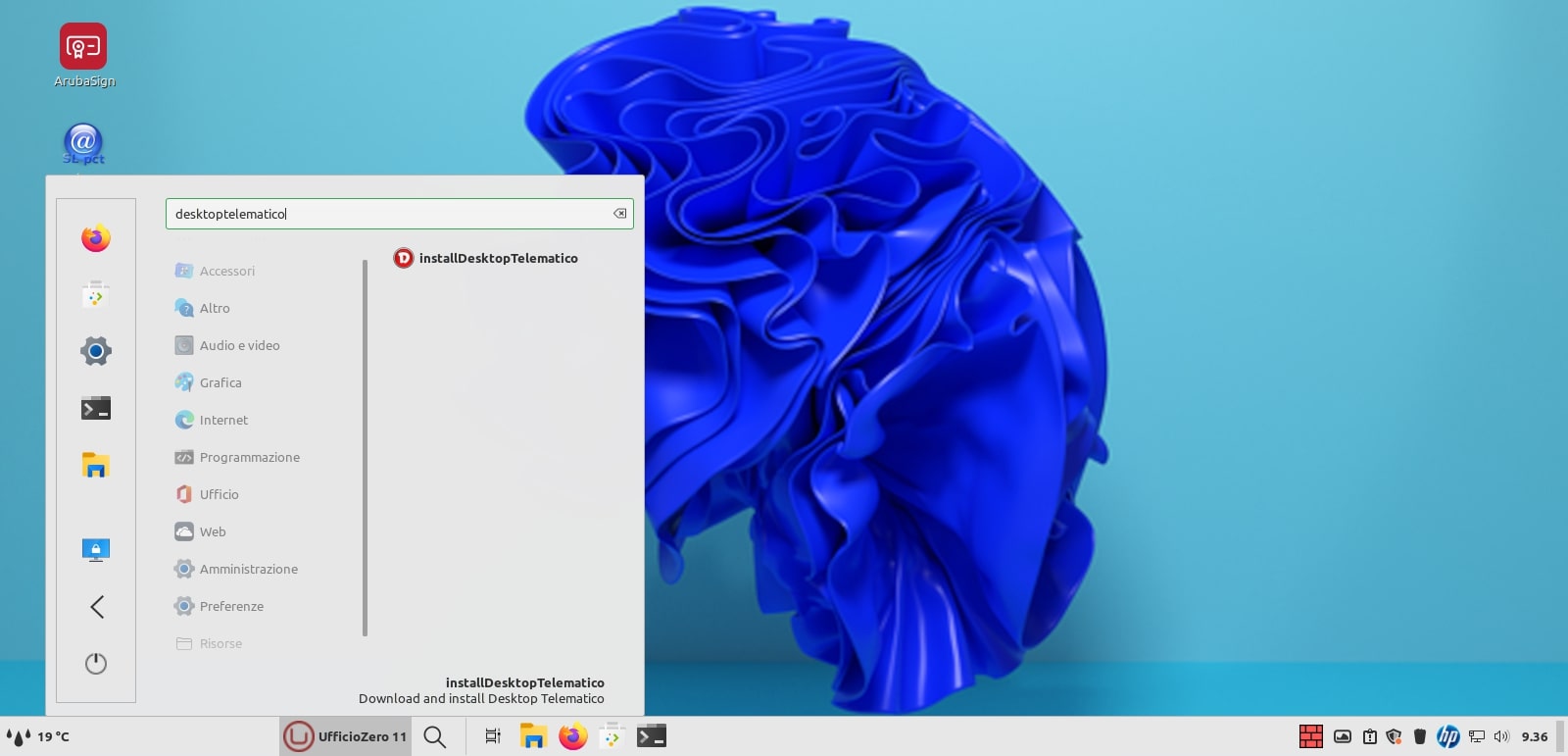
- avvio del programma che scaricherà la versione funzionante per il sistema in uso
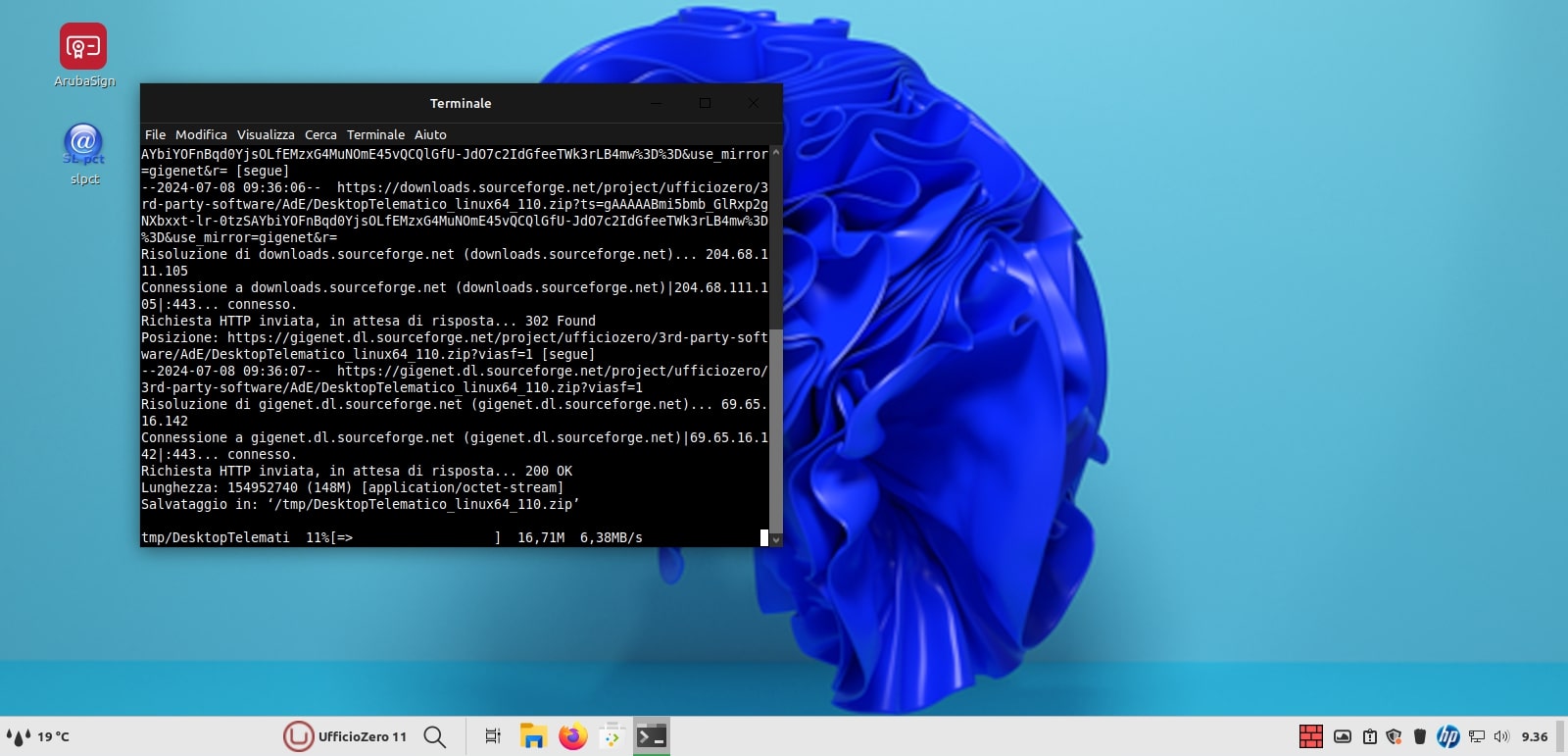
- l'icona di Desktop Telematico verrà creata automaticamente sul vostro desktop
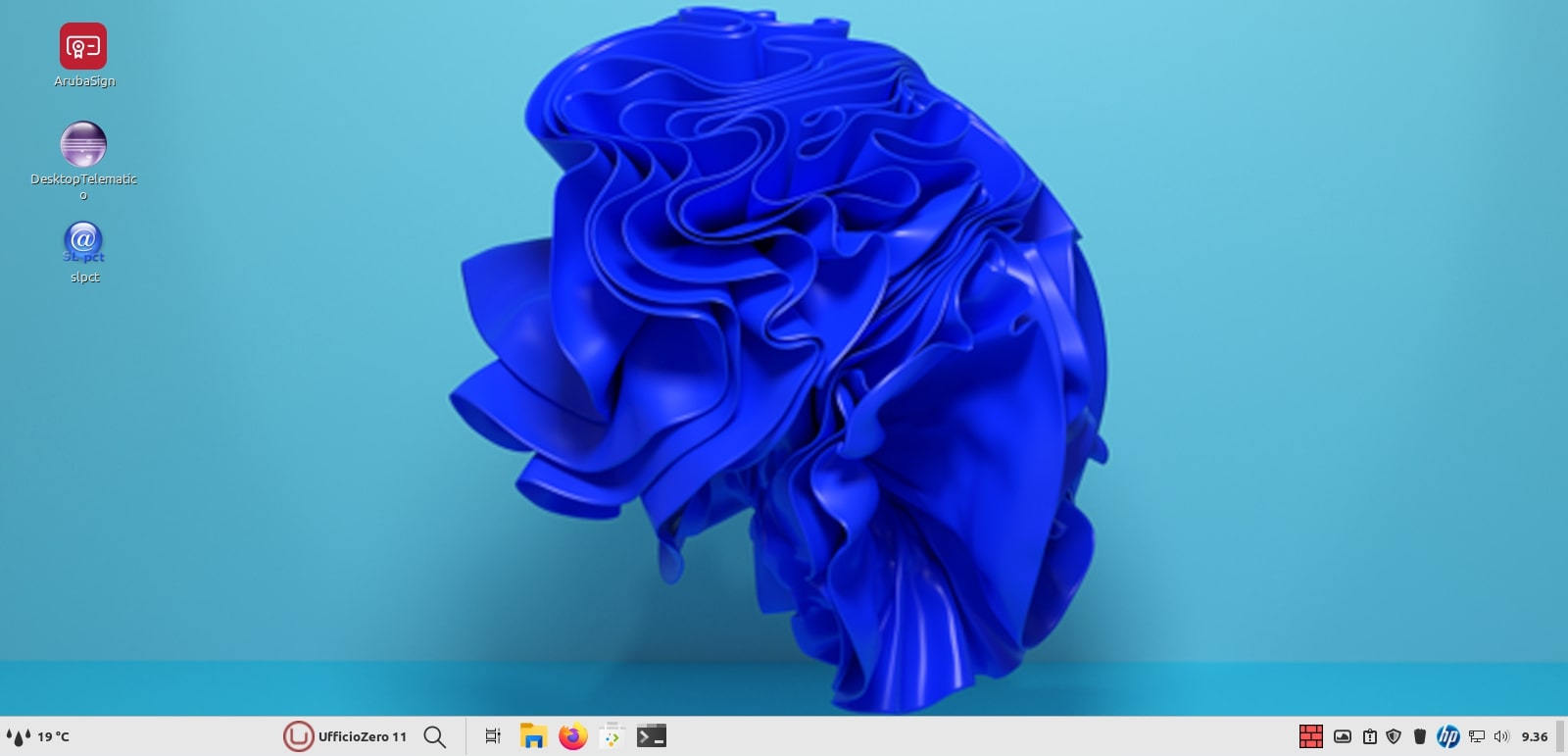
- avviate l'applicazione
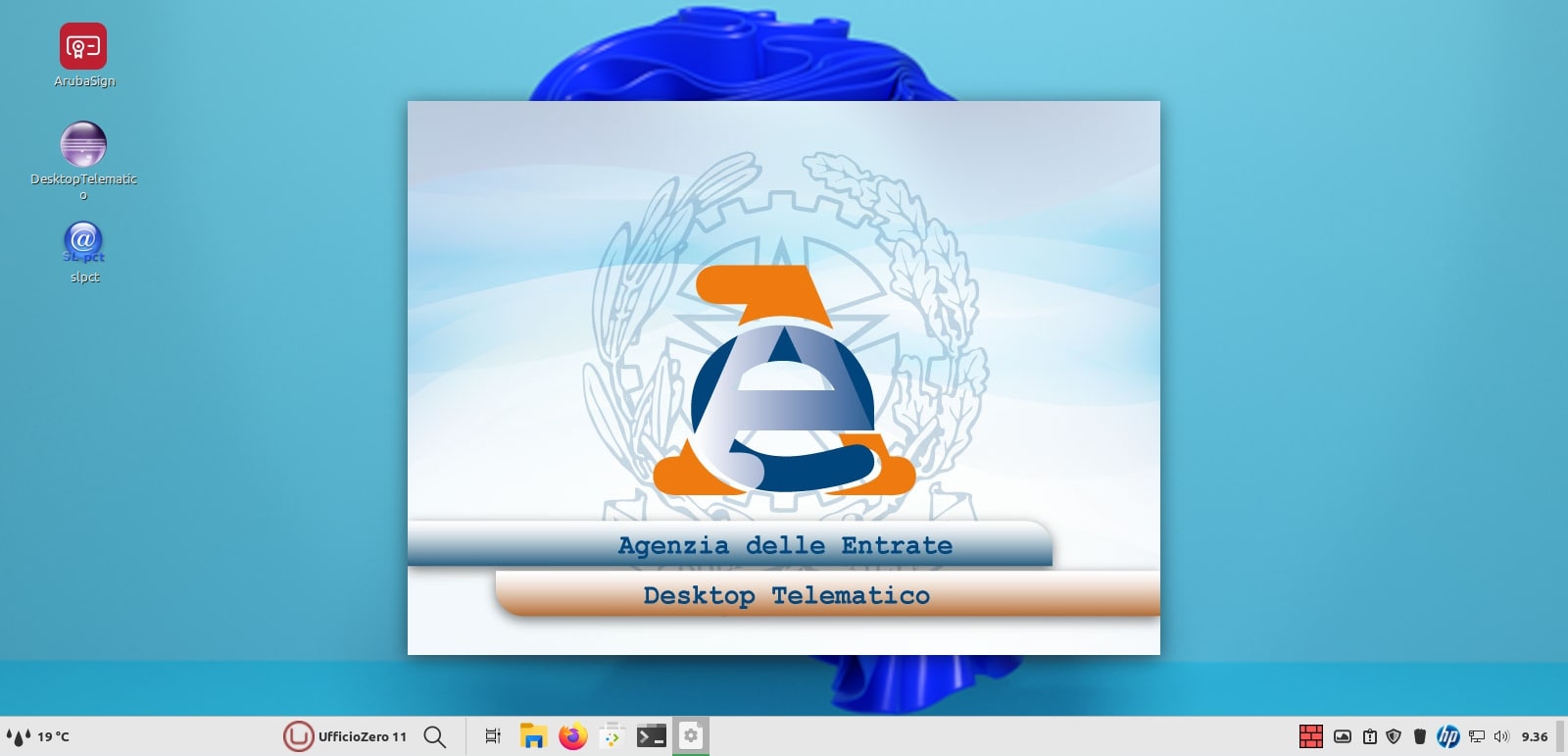
- create un nuovo utente agendo appunto su "nuovo utente"
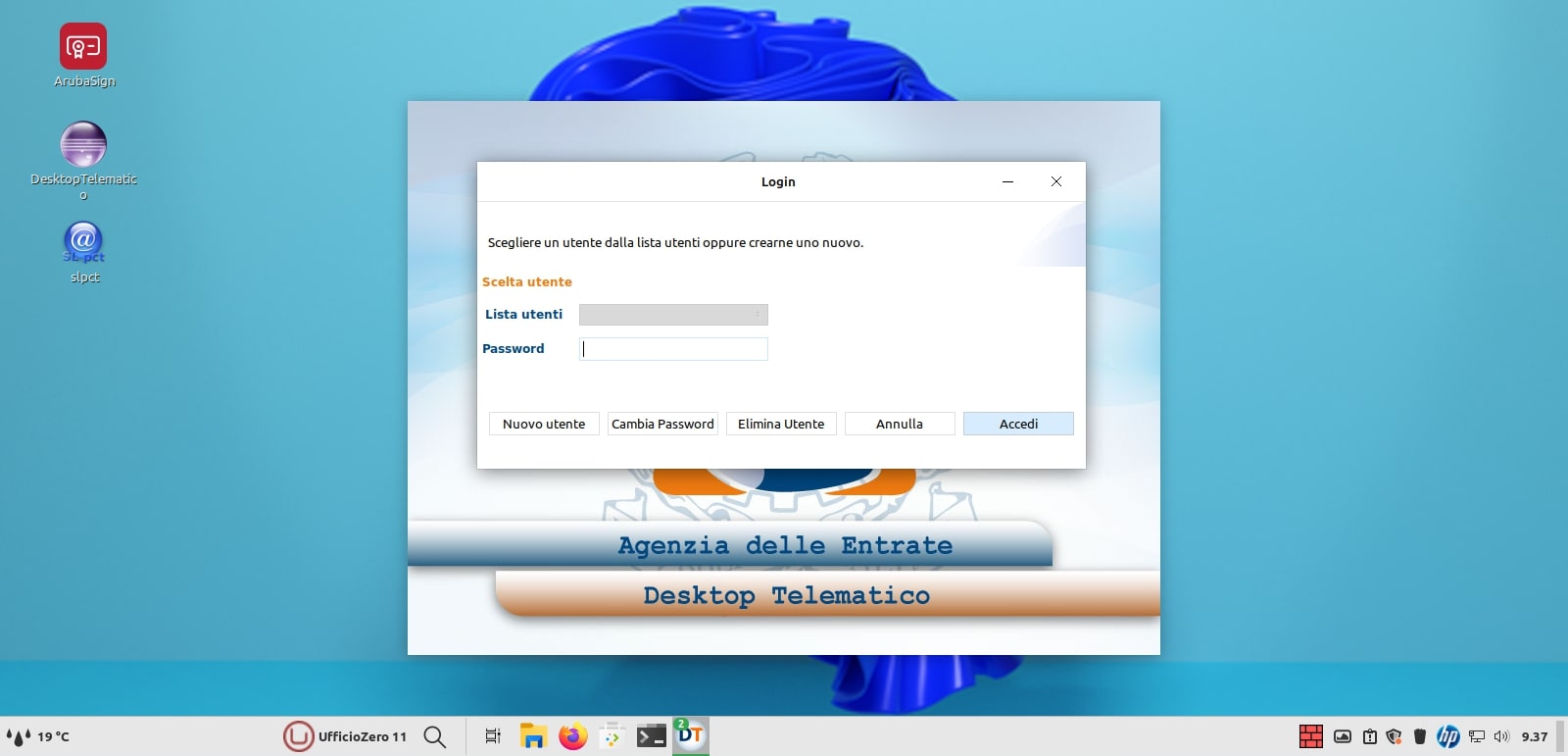
- dopo la creazione dell'utente e della relativa password occorre creare un'area di lavoro agendo su "crea cartella" e "digitare il nome della nuova cartella" (ad es. AreaAdE) e cliccare su OK
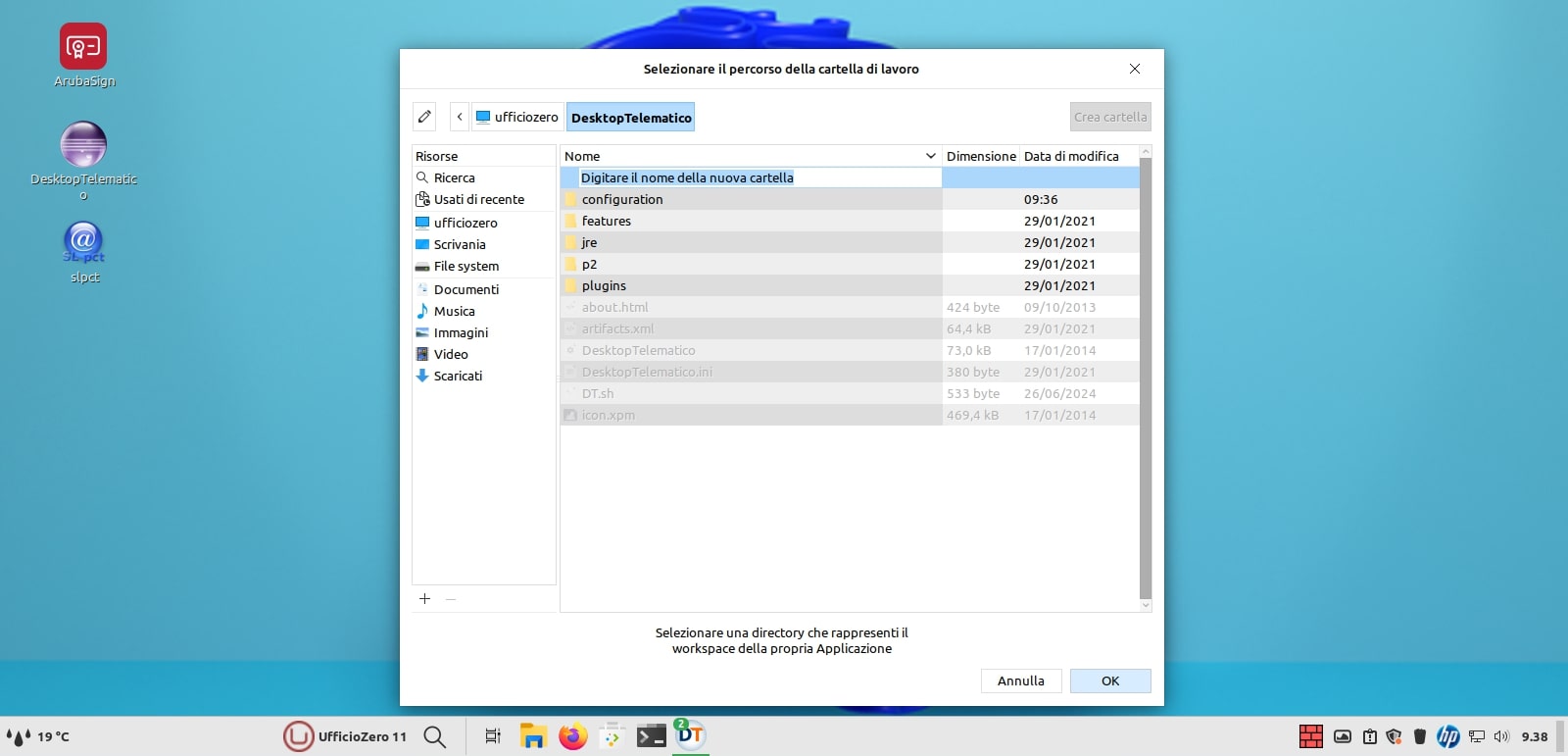
- il nuovo utente è stato creato per cui è possibile ora accedere con le credenziali appena create
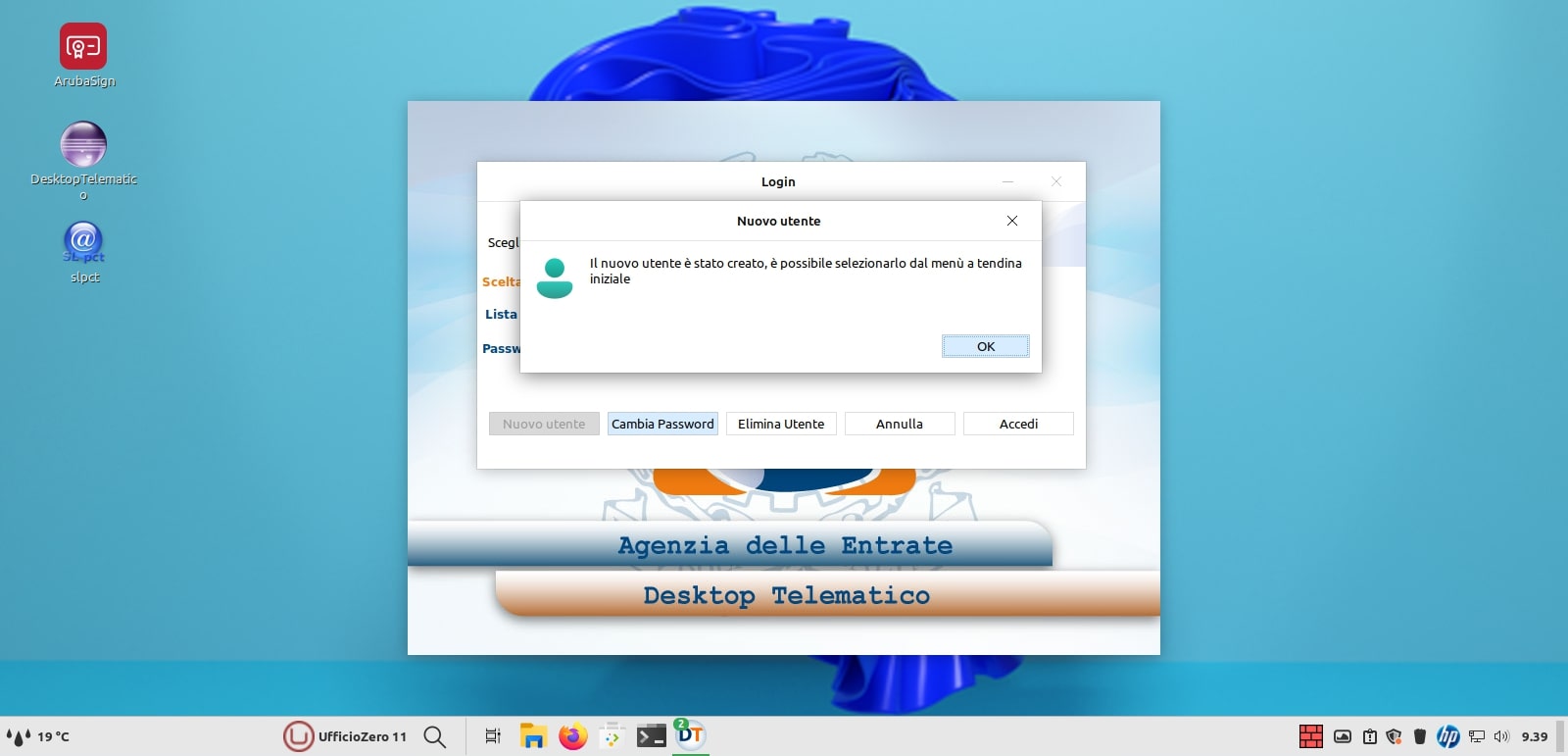
- l'applicazione inizia a fare un controllo degli aggiornamenti ed eventualmente a scaricarne di nuovi

N.B. la creazione dell'utente è a titolo di esempio, le funzionalità successive non sono state testate e richiedono un feedback da parte vostra mediante apertura di una discussione nel forum.
Julian Del Vecchio 25/06/2024 0
Yandex si aggiunge alla lista dei nostri mirror
Yandex, il competitor dell'est di Google, si aggiunge alla lista dei nostri mirror per tutte le nostre release.
Per il nostro progetto è importante avere quante più risorse tecnologiche possibili, al fine di continuare a rilasciare i nostri aggiornamenti di sistema in modo quanto più rapido possibile.
Tutte le release riceveranno nelle prossime ore alcuni aggiornamenti di sistema che chiediamo ai nostri utenti di applicare per avere maggiore sicurezza e flessibilità in termini di banda di download dei vari aggiornamenti proposti.
Inoltre anche il download delle iso via torrent sarà più prestante, poichè utilizziamo Yandex in aggiunta agli altri mirror come veri e propri peer.
Ringraziamo quindi Yandex per il supporto fornito al progetto Ufficio Zero Linux OS.
Yandex, Google's eastern competitor, joins the list of our mirrors for all our releases.
For our project it is important to have as many technological resources as possible, in order to continue releasing our system updates as quickly as possible.
All releases will receive some system updates in the next few hours that we ask our users to apply to have greater security and flexibility in terms of download bandwidth of the various proposed updates.
Furthermore, downloading iso files via torrent will also be more efficient, since we use Yandex in addition to the other mirrors as real peers.
We therefore thank Yandex for the support provided to the Ufficio Zero Linux OS project.
Julian Del Vecchio 23/06/2024 0
La release 10 Plus è stata rilasciata!
Gli utilizzatori della release 10 Basic sanno che a breve il loro sistema operativo terminerà il supporto, ma non abbiamo pensato solo a loro, estendendo il ciclo di vita del loro sistema di altri 3 anni (aggiornando alla 10 Plus con le indicazioni inserite in questo articolo), bensì abbiamo creato delle nuove iso della release 10 Plus, che è quindi disponibile al download.
Siamo convinti che gli affezionati a Windows 10 che a breve saranno costretti a prendere una decisione, valuteranno positivamente il nostro progetto, per cui di fatto ci offriamo come l'alternativa gratuita a Windows 10: nessun costo di licenza, nessun costo nascosto, la tua privacy resta solo tua, un repository (in continuo aggiornamento) con i driver di numerose stampanti e multifunzioni e le stesse applicazioni di Windows su Ufficio Zero Linux OS anche grazie all'utilizzo di WineHQ.
Anche la nuova release 10 Plus sarà disponibile per hardware a 32/64 bit per cui, di fatto, non stiamo tralasciando, ancora una volta, l'architettura a 32bit.
Di seguito il link ad un breve video dell'installazione del sistema operativo Ufficio Zero Linux OS 10 Plus.
Ufficio Zero Linux OS è per tutti voi!
Users of the 10 Basic release know that their operating system will soon end support, but we have not only thought of them, extending the life cycle of their system by another 3 years (updating to 10 Plus with the indications included in this article), but we have created new ISOs of the 10 Plus release, which is therefore available for download.
We are convinced that fans of Windows 10 who will soon be forced to make a decision will evaluate our project positively, so in fact we offer ourselves as the free alternative to Windows 10: no license costs, no hidden costs, your privacy remains only yours, a repository (continuously updated) with the drivers of numerous printers and multifunctions and the same Windows applications on Ufficio Zero Linux OS also thanks to the use of WineHQ.
The new 10 Plus release will also be available for 32/64 bit hardware so, in fact, we are not neglecting, once again, the 32bit architecture.
Below is the link to a short video of the installation of the Ufficio Zero Linux OS 10 Plus operating system.
Ufficio Zero Linux OS is for all of you!